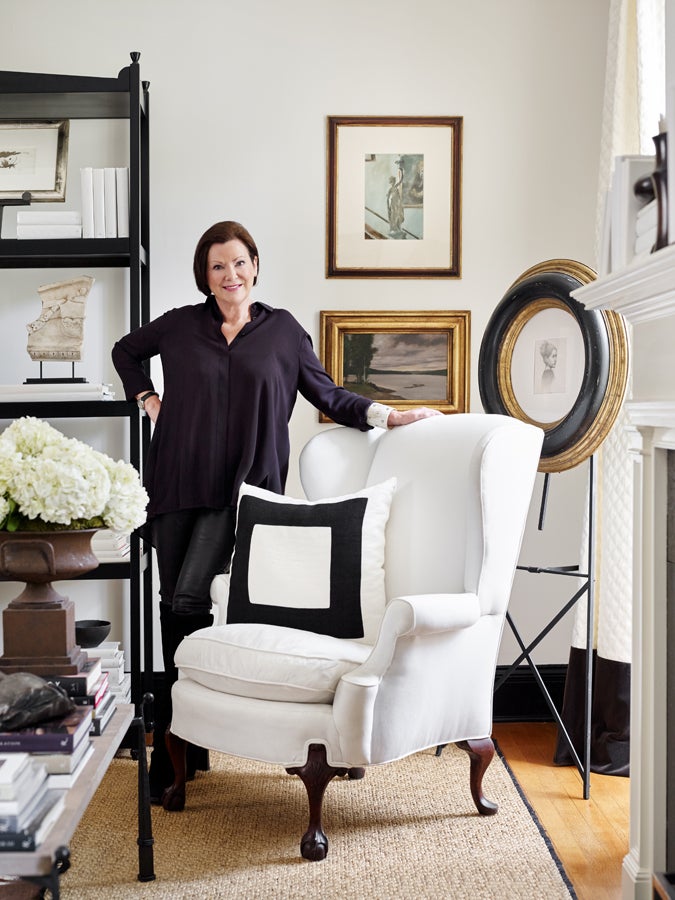When Atlanta-based designer Beth Webb moved to New York to work at an art gallery, she didn’t know her first project would come from hosting a dinner party—at the time, she didn’t even know she wanted to be a designer. At the table, she sat next to the Coca-Cola Bottling Foundation’s vice president, who had just bought an 1892 Second Empire house to convert to an office—he offered Webb the chance to pitch herself for the project. The job ultimately launched Webb’s career, which she describes as both artistic and practical.
“The reality of this business is there’s 5 percent of creativity up front and 5 percent on the hind end,” Webb tells host Dennis Scully on the latest episode of The Business of Home Podcast. “Everything else in between is logistics. There are a lot of very creative and very talented people out there that can’t do this job if they don’t have a right brain and a left brain. You’ve got to learn the business of interior design.”
The business of interior design was certainly complicated by the pandemic, which shifted the way Webb navigated her relationships with vendors. Like many other designers, she worried about the fate of manufacturers at the onset of the pandemic, so her office collected less upfront from clients and put down smaller deposits. However, when business soared, her firm returned to the practice of collecting 100 percent of the payment for goods upfront. Whatever the terms of payment, Webb aims to give clients complete transparency. “I tell many of our clients in the initial interview, ‘Your [spouse] is going to love our process because we’re businesspeople, and you’re going to get every number we have upfront in your proposal,’” says Webb. “Every single solitary ‘i’ is dotted and every ‘t’ is crossed. It is very fiscally responsible for our clientele.”
The pandemic also put a strain on Webb’s shopping practices, which often consisted of sourcing her fabric, lighting and furniture selections from her neighborhood design center, ADAC. But despite the rise of e-commerce and Zoom showroom tours, Webb still believes in the benefits of in-person shopping and doubts that digital platforms will make showrooms obsolete.
“During COVID, we had to do a lot of virtual presentations and shopping, but the first thing clients wanted to do the minute they could was get back out there and shop in person and go touch it, see it, feel it,” says Webb. “Let’s face it, buying online all day long is exhausting. I have a headache at the end of the day, my eyes hurt, and half the time when you get it, it’s not even close to what you thought it was going to be.” Plus, buying online requires a huge margin of error in case clients are not precise with measurements, or costly mistakes can ensue, she adds.
Similar to her loyalty to ADAC, Webb champions her relationships with local vendors, recommending her clients stick to high-end manufacturers in their community while supply chain chaos lingers on. “Our local shops and workrooms are able to deliver faster than the big manufacturers—they’re building their own frames, they’re upholstering their own goods,” says Webb. “Our high-end goods are getting a much faster turnaround, and their lead times tend to be the same as they’ve always been.”
Being able to perfect these details and create showstopping spaces in a world where supply chain shortages and sky-high installation prices prevail proves why being an interior designer is not just a “glamour job,” according to Webb. “Interior design is a business,” she says. “It’s just like dealing with your dentist or your lawn service. Everyone deserves to make a living, and a lot of designers discount that and discount themselves. I think they need to take pride in what they do and see the importance of what it is that they do. In every possible way, getting from A to Z can be exhausting. It is a messy, painful process to make something beautiful.”
Listen to the show below. If you like what you hear, subscribe on Apple Podcasts or Spotify. This episode was sponsored by Loloi Rugs and Modern Matter.
Hompage image: Beth Webb | Courtesy of Beth Webb





























